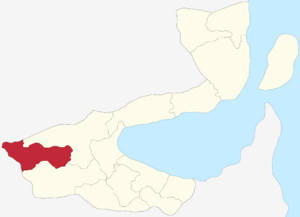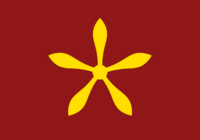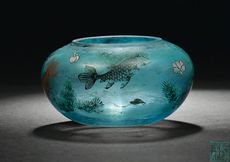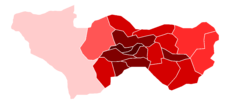Wuzhong
Wuzhong 吴忠州 Wúzhōng zhōu | |
|---|---|
 Map of Monsilva with Wuzhong highlighted | |
| Country | |
| State status | 1 July 1984 |
| Capital | Wodai (沃埭) |
| Government | |
| • Body | Wuzhong State Government |
| • Premier | Tsui Chin (FDP) |
| • Deputy Premier | Chow Yin-jun (FDP) |
| Population (July 2022) | |
| • Total | 3,691,470 |
| Time zone | AMT+12 (Monsilvan Western Time, MWT) |
| ISO 3166 code | MS-WUZ |
| GRP (¥) | ¥686 billion |
| Major airports | Wodai City Airport (WCA) |
| Transit System(s) | MRA Wodai Metro |
| Police[1] | Wuzhong State Police |
| Ambulance[2] | Wuzhong State Ambulance |
| Fire[3] | Wuzhong Fire Service |
Wuzhong (Monsilvan: 吴忠州; Pinyin: Wúzhōng zhōu), is a state of the Monsilvan Republic. The state has around 3.7 million people, with 61% of them living in the state's capital, Wodai. It is located in western Monsilva, sitting south of Weishi and the nation of Akvarelusus, north of Xishanjia and east of the nation of Baltanla. Wuzhong is a mountainous state known for its historic architecture and natural beauty. The state of Wuzhong is governed by the Wuzhong State Government, with Tsui Chin of the FDP being the current premier. The state is divided into 6 districts, 19 counties, 34 legislative constituencies and 80 municipalities and is equally represented by 6 Senators in the Senate and 34 members in the Legislative Assembly. The Wuzhong State Parliament consists of 80 seats, and is currently lead by the FDP, with the Reformed National Party leading the opposition.
Wuzhong is Monsilva's 6th most populous state, but has only the ninth highest urbanization of all the fifteen states. Wuzhong has a predominantly urban industry as agriculture is difficult due to the state's geography. This includes the large commerical industry in Wodai as well as the technology manufacturing. Although, Wuzhong does have an agricultural industry, mostly consisting of rice. Other cities in Wuzhong are: Dali, Lu'an, Qidong and Wufeng. Dali is by far Wuzhong's largest city other than the capital with a population of just over 596k people. Dali is located in western Wuzhong, not far from Wodai. Dali is a predominantly residential city, with the centre being made up of small commercial businesses and nation-wide chains such as LM Mart. Wuzhong has a nominal GRP of around ₵114 billion, giving it a GRP per capita of ₵30,831.
Wuzhong is served by the Monsilvan Railways Administration which connects the state to the rest of Monsilva. Wodai has the Wodai Metro which serves all of greater Wodai City as well as connecting to Dali and other surrounding towns. Wuzhong has one international airport: Wodai City Airport. The Monsilvan high-speed rail service serves Wodai Central. The high-speed runs to cities such as Dishui (Sanzhong) and Amking.
Contents
Toponymy
The name, Wuzhong comes directly from the HY Pinyin of the Monsilvan "吳忠". The character "吳" means "Wu" in Monsilvan. Wu was a region of the Han dynasty and was named after the second emperor of the dynasty when he was born. The character "忠" means "loyal". Therefore, Wuzhong directly translates to "loyal Wu", which was probably because Emperor Wu was well liked by the people of the Han dynasty as they believed he ruled for the people rather than over them. They likely added "忠" to the name of the region after he died as a tribute to his legacy.
History
Prehistory and early dynasties
Wuzhong was inhabited by very few people throughout its prehistory, however during the early 5th century BCE, the population began to grow. In 60 CE, when the Han dynasty was formed, Wuzhong had produced a large enough population for it to be an important region in the relatively small dynasty.
Wuzhong was a region of many small towns, producing unique goods such as ceramics, glass, statues and tools which the dynasty sold to neighbouring dynasties and nations for income. The Han dynasty was a very passive dynasty, and the people of Wuzhong became very opposed to violence and war.
Zhou dynasty and the Empire of Baltanla
When the Unification of the Monsilvan Kingdoms took place in 1201, the Han dynasty was succeeded by the Zhou dynasty which now ruled over all of modern-day Monsilva. During this period, many people living in Wuzhong travelled out of the region for bigger settlements like Amking or even Luhai. This decrease in population affected the region significantly and it suffered from lack of workers for a long time.
The Zhou dynasty voluntarily ceded itself to the Empire of Baltanla in 1568 after suffering through several economic and political crises. During Wuzhong's period under the Empire, it saw great prosperity. Wuzhong became the connecting region between the lands of Monsilva, and the lands of Baltanla. This brought many travellers to and from the region, which grew its population and economy. It also massively effected its culture, which can still be seen today. For example, Wuzhong has the highest percentage of a state's population following Buddhism.
Kingdom of Great Shan and the Civil War
During the Kingdom of Great Shan, Wuzhong had become one of the kingdoms most populous regions, and therefore remained important to the central government based in Amking. But the issue, was that the central government was based in Amking, and had little control over what Wuzhong did. This essentially classified Wuzhong as an autonomous region, as it had its own council which did as it pleased, with limited aknowledgement from the government.
Wuzhong did not physically experience much of the civil war, as the war was focused in the Xiaoguan stretch and in Bazhong and Amking, which is on the other side of the country. However, the ceasing of trade and instability of the government and economy still did a toll on the region's people. Famine and poverty struck Wuzhong very quickly after the war began. Baltanla offered limited support to the region during the war, especially due to its large Baltanese population, which solved the famine, but poverty remained an issue.
Kingdom of Monsilva and the Republic
After the civil war, thanks to the aid from Baltanla, Wuzhong recovered fairly quickly. It began an industry of cheap but quality goods which it distributed across the country after the war to assist in the recovery. Wuzhong remained a populous and important economic region during the period from the 1830s to 1970s.
During Martial law in Monsilva, Wuzhong was highly supressed by the state police, this was due to the Wuzhong people peacefully protesting in the streets almost every week. The increased police presence also increased the amount of brutality against non-Monsilvans as well as people who broke the strict laws. In 1978, Wodai and Dali were some of the many cities which took part in the 1978 Monsilvan protests, which lead to the eventual dissolution of the Kingdom of Monsilva government and the establishment of the Republic by the Monsilvan Revolutionary Army.
Wuzhong had been merged with Weishi during the Kingdom of Monsilva to form the region of Guangsu, so when the republic was established, Wuzhong along with Weishi were both under one state. So even when the country became federal in 1983, Wuzhong was a part of the federated state of Guangsu. The 1983 Guangsu state election was the only election to take place in the former state. In 1984, Guangsu was divided into Wuzhong and Weishi. This also included the establishment of the Wuzhong State Government, which has been governed by the FDP since establishment.
Administration
Local government
The state of Wuzhong is governed by the Wuzhong State Government, based in the Wuzhong State Office in Wodai. The state parliament is a unicameral legislature consisting of an 80-seat State Parliament. Each municipality in Wuzhong is represented by one State Parliament Member. Members are elected for four-year terms. The Parliament meets every week, with the day depending on the first weekday after the state election which takes place in different states at different times. The leading party in the State Parliament determines who will be the Premier. Tsui Chin of the FDP has been the Premier of Wuzhong since 2022.
National government
Wuzhong is represented in the Parliament of Monsilva by 6 Senators in the Senate of Monsilva and 34 Members of the Legislative Assembly.
Geography
Wuzhong has very mountainous terrain, even the city of Wodai is made up of many hilly streets and is saddled by mountains on either side. Wuzhong is also abundant in flora, with forests all across the state. The mountains are much more climbable in Wuzhong than in Weishi, which has lead to many towns being at very high altitudes.
Wuzhong is also home to many lakes and rivers which weave through the central region of the state and through Wodai, which is made up of many small rivers which pass through the valley.
Climate
Wuzhong is a temperate state, with temperatures getting very warm in the summer, and midly cool in the winter. Snow or ice is only found at the very peaks of taller mountains, and would not be found lower down or in any urban areas. Temperatures usually peak at 32 degrees celcius, and sink to a low of around 15 degrees celcius.
Demography
| Country of Birth | Population | Percent | |
|---|---|---|---|
| 1,941,713 | 52.6 | ||
| Non-Monsilvan | 1,749,757 | 47.4 | |
| 856,421 | 23.2 | ||
| 830,581 | 22.5 | ||
| Others | 62,755 | 1.7 | |
| Total | 3,691,470 | 100.0 | |
The 2022 census recorded that 1,749,757 people or 47.4% of Wuzhong's population were of non-Monsilvan descent. The table to the right shows the most common countries of origin of Wuzhong residents. Wuzhong has a large urban population which increases the number of foreign citizens in the state. 84% of Wuzhong's population live in cities, being Wodai, Dali or other. These cities are also where the vast majority of Wuzhong's non-Monsilvan population lives. The other 16% makes up Monsilva's fifth largest rural population by state, with around 570,000 people living outside of cities.
Religion
Wuzhong has a majority Buddhist population, whilst Monsilvan folk religion comes in second. Around 78.3% of Wuzhong's population follow Buddhism to some extent. This is not only the highest percentage of a state following Buddhist, but also the highest percentage following any one religion.
Following Buddhism in the census was Monsilvan folk religion at 13.9% of the population; then it was the 'Unaffiliated' category (people who do not follow any organized religion, including atheism and agnosticism) at 6.3%; and finally 'Other' (which includes Christianity and Islam) took up the last 1.5%.
Transport
Wuzhong's transport is administered by the state's Department for Transport, which is a sub-department of the federal Department of Transport. Wuzhong has extensive rail access, thanks to the Monsilvan Railways Administration and Wodai Metro all running services through the state.
Wuzhong is one of the most accessible states by rail transport, with several commuter, high-speed and international railways services within the state.
Education
Education is mandatory until the age of 18 for children living in Wuzhong, which is two years above the minimum age at the federal level (16). Wuzhong's towns and cities feature many schools, from elementary to high school. As well as this, Wuzhong is home to many higher education institutes including:
The University of Wodai (UWI) is a highly regarded university in Monsilva which is well known for its economics, business and politics courses. It has some of the highest entry requirements of any university in Monsilva, on par with top universities such as Central Amking University and the University of Luhai.
Dali Sports University is a university based in Dali specialising in sports science and physical education. The university has graduated many top athletes and players in the sport industry over many years, including top Monsilvan yuchio player, Jia Li-hung.
Culture
Tourism
Wuzhong is frequently visited by tourists, especially for its historical locations. Wodai features hundreds of traditional temples, homes and businesses, some dating almost a millennia old. However, many also visit Wuzhong for its rural nature. The state has many national parks including
Examples of major tourist attractions in Wuzhong include: the Fo Guang Buddhist Temple, Temple of Heaven, Tai Chung Monastery, Eternal Autumn Shrine and Wandung National Park.
Sport
Martial arts and football are the top sports in Wuzhong. Martial arts has a strong history with Wuzhong, including the famous Shaolin Kung Fu which is taught by many Buddhist monks in the state. Wuzhong is home to more martial arts centers than anywhere else in the country, and Wodai has the highest concentration of martial arts centers in the world.
Football is also popular in Wuzhong. The top team in the state is Wodai City F.C., which is currently in the Monsilvan Super League. The popularity of football in Wuzhong has been growing substantially in recent years due to the unprecendented success of Wuzhong teams in recent seasons.






